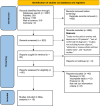Anxiety and Depression Among Adults and Children With Celiac Disease: A Meta-Analysis of Different Psychiatry Scales
- PMID: 39669540
- PMCID: PMC11633532
- DOI: 10.1176/appi.prcp.20230076
Anxiety and Depression Among Adults and Children With Celiac Disease: A Meta-Analysis of Different Psychiatry Scales
Abstract
Background: Celiac disease (CD) is an autoimmune disorder in which genetically susceptible individuals cannot digest gluten (wheat) and its homologs such as Scalin (rye) and Hordein (barley).
Aim: This systematic review and meta-analysis aimed to investigate the measures of associations between CD and psychiatric disorders, specifically anxiety and depression, and explore the relationship between adherence to a Gluten-Free Diet (GFD) and the psychiatric aspects of the disease.
Methods: We searched PubMed, Scopus and Web of Science for articles investigating anxiety and depression in CD patients. The following inclusion criteria were implemented: Primary research articles (either observational or experimental) that include participants with a CD diagnosis -confirmed either serologically, with anti-endomysial antibodies, anti-tissue transglutaminase antibodies, or with duodenum biopsy, whether on a GFD or not,-who have depression or anxiety symptoms identified through self-report or clinician-administered scales.
Results: CD patients are at a higher odds of developing anxiety, as the odds ratio was (OR: 2.26, 95% CI: [1.10, 4.67]) and depression symptoms (OR: 3.36, 95% CI: [1.36, 8.32]). Results of both State-Trait Anxiety Inventory Y-1 and Y-2 improved after 1 year of GFD with mean difference of 3.48, 95% CI: (0.26, 6.71), and MD: 3.45, 95% CI: (1.39, 5.52), respectively.
Conclusion: Anxiety and depression are prevalent among adults and children CD patients as they are observed to have high odds of anxiety and depression as expressed by various scales. It is reported that GFD is associated with decreased levels of anxiety and depression, however, further studies are required to confirm these findings and to investigate the main mechanism of psychiatric disorders among CD patients.
© 2024 The Author(s). Psychiatric Research and Clinical Practice published by Wiley Periodicals LLC on behalf of American Psychiatric Association.
Figures



References
-
- Leffler DA, Acaster S, Gallop K, Dennis M, Kelly CP, Adelman DC. A novel patient‐derived conceptual model of the impact of celiac disease in adults: implications for patient‐reported outcome and health‐related quality‐of‐life instrument development. Value Health. 2017;20(4):637–643 (in English). 10.1016/j.jval.2016.12.016 - DOI - PubMed
Publication types
LinkOut - more resources
Full Text Sources
Research Materials
